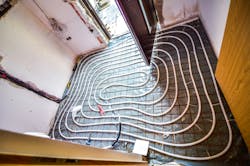Many years ago, the Radiant Panel Association, predecessor of the Radiant Professionals Alliance (RPA), developed the first certification program for radiant installers and designers. I was one of the folks who took the time and sat for the very strenuous examination. If memory serves me correctly, I passed by the skin of my teeth.
It was a fairly tough test and required a thorough knowledge of all aspects of radiant heating systems. The only real dilemma with the program was that it didn’t have any requirements as it pertains to documentable field experience, which meant that book smart individuals could apply for and sit for the exam without the need to show actual field experience. The other issue I had with the program was that it was only recognized by other members of the old Radiant Panel Association. Times have changed.
The new RPA, in conjunction with ASSE Intl., has developed a Professional Qualification Standard, ASSE Series 19000: Hydronic Systems Professional Qualification Standard, using ANSI-recognized standard development protocols. The standard addresses the requirements for the certification of hydronic system designers (ASSE Standard 19220), and hydronic system installers (ASSE Standard 19210). This standard can be purchased through the ASSE online bookstore by going to http://stores.assewebstore.com/.
These standards were developed using an open consensus process that included input from experienced industry experts, including many RPA members. Our hopes are that the authority having jurisdiction will recognize these certification standards for the professionalism that they represent, and that they will become requirements for being able to work within a given jurisdiction.
The ASSE Hydronics Technical Committee has developed the questions that will be used to test the knowledge of the applicants as it pertains to the design and installation of hydronic heating and cooling systems (radiant, as well as convective systems). Certification for solar water heating system installers (ASSE Standard 19110) will be available shortly.
The RPA is partnering with the hydronics manufacturing industry and other manufacturer reps and wholesalers to provide training to these standards, as well as providing a place for the proctored examinations to be given. Training providers will go through an application process in order to assure that the instructional objectives and materials used in the training are consistent in their delivery, and complete in their content. The instructors’ qualifications will also be reviewed prior to ASSE approving them to teach the course.
Potential training providers who are interested in learning more about the certification program should contact Marianne Waickman at [email protected] or by telephone at 708/995-3015.
For the purposes of becoming a certified hydronic system installer, a candidate must demonstrate two years of documented practical experience in the installation and maintenance of piping systems, and successful completion of a minimum of 24 hours of ASSE approved hydronic heating and cooling installation training. A certification exam, consisting of 100 questions, will be administered immediately following the completion of the training. The exam will be administered at the training facility. The certification is good for three years, at which time the installer can recertify.
The standard addresses requirements for certification of hydronic system designers, installers.
A candidate for hydronic system designer certification must demonstrate four years of documented practical experience in the design of piping systems, or six years of installation experience as a piping systems installer within the preceding 10 years and successful completion of a minimum of 24 hours of ASSE approved hydronic heating and cooling design training. It is similar to the installers’ certification in that a certification exam, consisting of 100 questions, is administered immediately following the completion of the training. The exam is administered at the training facility. The certification is good for three years, at which time the installer can recertify.
Recognizing that it is difficult for contractors to take time away from their businesses to attend classes, the RPA is exploring how all or part of the required training can be conducted online.
The RPA will continue to make announcements about training opportunities as they develop. These programs will be available by the third quarter of 2016.Certification goes a long way toward proving that you have the skills and qualifications necessary to properly design and install hydronic systems. Once certified, you will be able to advertise that you and/or your employees are ASSE Certified Hydronic Systems Professionals.We developed this program in an effort to raise the bar of professionalism of our industry. We hope that you will realize the value of this program and make an effort to become certified under the professional standards.
Mark Eatherton material on this website is protected by Copyright 2016. Any reuse of this material (print or electronic) must first have the expressed written permission of Mark Eatherton and CONTRACTOR Magazine. Please contact via email at: [email protected].
About the Author
Mark Eatherton
Mark Eatherton material on this website is protected by Copyright 2017. Any reuse of this material (print or electronic) must first have the expressed written permission of Mark Eatherton and CONTRACTOR Magazine.
